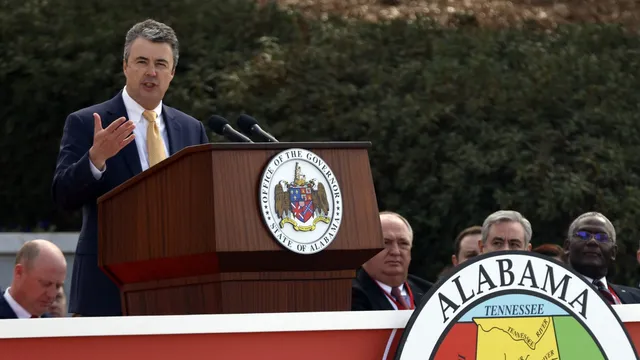
Federal judge rules Alabama can't prosecute abortion travel assistance
2025-04-03 00:00- A federal judge ruled that Alabama cannot prosecute those aiding women in traveling to obtain legal abortions elsewhere.
- The decision arose from a lawsuit by the Yellowhammer Fund and medical providers against Alabama’s attorney general.
- This ruling is seen as a victory for reproductive rights advocates in Alabama.
Express your sentiment!
Insights
In a significant ruling issued by U.S. District Judge Myron Thompson, it was determined that Alabama’s attorney general lacks the authority to prosecute individuals or organizations that assist Alabama women in traveling to other states for abortion services. This decision stemmed from a legal challenge by the Yellowhammer Fund, which provides financial assistance for abortions, and other medical providers who were concerned about possible prosecution under Alabama's anti-conspiracy laws as suggested by Attorney General Steve Marshall. Judge Thompson’s 131-page opinion emphasized the protection of First Amendment rights and the fundamental right to travel freely within the United States. The Alabama attorney general's office had previously indicated that it might investigate whether such assistance could breach state conspiracy laws, but he had not initiated any prosecutions at the time of the ruling. This ruling emerged amid Alabama's stringent abortion laws that prohibit the procedure at any stage of pregnancy, without exceptions for cases of rape or incest. Judge Thompson highlighted a critical distinction in his ruling, stating that while Alabama can legislate on matters within its jurisdiction, it cannot enforce its laws or values on its citizens when they operate outside its boundaries — in this case, seeking lawful medical procedures in states where abortion is permitted. The case underscored the ongoing clash between state regulations and individual constitutional rights, particularly concerning reproductive health and the role of supportive organizations in assisting women. Advocacy groups like the Yellowhammer Fund had previously halted the distribution of financial support due to fears of legal repercussions, emphasizing the importance of the federal court's ruling as a win for those seeking accessible reproductive healthcare. Following the ruling, Jenice Fountain, executive director of the Yellowhammer Fund, expressed relief, stating that the efforts of the Alabama attorney general to limit access to necessary medical care had failed. The attorney general’s office is currently reviewing the decision to determine any potential next steps, indicating the possibility of further legal or political maneuvers surrounding the contentious issue of abortion and state authority in Alabama. This decision represents a pivotal moment for reproductive rights in Alabama and reflects broader struggles over abortion access across the United States, particularly in states with strict anti-abortion laws. The implications of this ruling may resonate beyond Alabama as it sets a precedent for how state laws interact with federal constitutional rights.
Contexts
The history of abortion laws in Alabama is characterized by a series of legal challenges and shifting societal attitudes. Abortion was initially legal in Alabama only under specific circumstances, such as to save the life of the mother. The late 1960s marked a turning point with the movement toward more liberal abortion access, though significant restrictions still remained. The landmark 1973 U.S. Supreme Court decision in Roe v. Wade invalidated many state laws limiting access to abortion, including those in Alabama, establishing a woman's right to choose within the first trimester of pregnancy. This ruling set the stage for subsequent legislative and judicial battles over abortion rights within the state and across the country. Throughout the 1980s and 1990s, Alabama legislators attempted to restrict abortion access through various means, including mandatory waiting periods and parental consent laws for minors. In particular, the 1989 case of Webster v. Reproductive Health Services prompted Alabama legislators to introduce more restrictive measures. By the late 1990s, Alabama phased in more conservative policies, reflecting the increasing influence of pro-life advocacy groups and shifting public opinion on the issue. The continued erosion of Roe protections saw Alabama pass additional laws aimed at limiting abortion, including a 1997 law that imposed a 24-hour waiting period prior to obtaining an abortion. The 21st century has witnessed a renewed wave of aggressive legislative measures aimed at restricting abortion access even further in Alabama. Among the most significant was the Human Life Protection Act passed in 2019, which aimed to ban nearly all abortions in the state, effectively nullifying the protections afforded by Roe v. Wade. This act reflected the growing challenges to abortion rights at the national level, particularly in the wake of shifts in the composition of the U.S. Supreme Court. Following the passage of the Human Life Protection Act, Alabama was thrust into the national spotlight as multiple legal challenges ensued, reflecting the contentious nature of abortion rights debates and the polarizing societal perspectives surrounding them. As of 2025, the debate over abortion laws in Alabama remains highly contentious. The state's legal landscape regarding abortion continues to be shaped by ongoing legal challenges concerning the enforceability of restrictive laws, along with public advocacy from both pro-choice and pro-life groups. National trends also influence local regulations, with federal judicial appointments and potential Supreme Court decisions playing critical roles in shaping the future of abortion rights in Alabama. The ongoing conflict over abortion illustrates the complex interplay between law, morality, and personal choice, making it a poignant aspect of Alabama's legislative history.